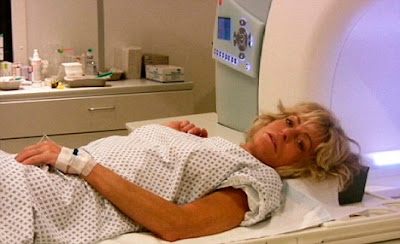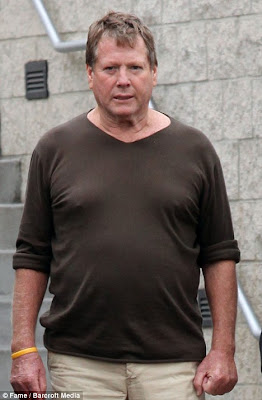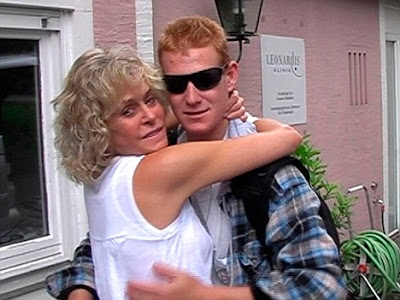
By Daily Mail Reporter
Last updated at 9:36 AM on 26th June 2009
Charlie's Angels star Farrah Fawcett yesterday lost her two-year battle with cancer.
The 62-year-old actress, who became an icon to millions during the 1970s, died in a hospital in Los Angeles surrounded by her family and friends.
A devout Catholic, the Charlie's Angels star was read the last rites this morning.
It had been her last wish to marry actor Ryan O'Neal, who she had a son with during a stormy relationship that lasted for 27 years.
But the wedding was not believed to have taken place due to the amount of medical care she needed.
O'Neal, 68, was at her side throughout her final days and was seen leaving the hospital after her death in tears.
In a statement O'Neal said: 'After a long and brave battle with cancer, our beloved Farrah has passed away.
'Although this is an extremely difficult time for her family and friends, we take comfort in the beautiful times that we shared with Farrah over the years and the knowledge that her life brought joy to so many people around the world.'

O'Neal said they planned to honour Fawcett with a funeral service at the Catholic cathedral in Los Angeles within the next few days.
Throughout Ms Fawcett's cancer battle - which was chronicled in a recent TV documentary Farrah's Story - the pair have been inseparable.
The actress's Charlie's Angel co-star Jaclyn Smith said: 'Farrah had courage, she had strength, and she had faith. And now she has peace as she rests with the real angels.'

She died just an hour after her troubled son Redmond, 24, was due in court to face a judge over his ongoing drug case.
He failed to turn up at court for his 9am hearing because of his mother's worsening condition and his case was put back to 1.30pm.
It is not known whether he will be granted special leave to attend his mother's funeral from prison.
Fawcett was first diagnosed with rectal cancer in 2006 and had surgery to remove a tumour that year. But a year later the cancer had returned and had spread to her liver.
That wholesome, toothy grin atop a breast-revealing red bathing suit beamed down from an astonishing 30 million posters around the world for a decade or more after 1976 - and transformed its owner from an aspiring shampoo model into one of the most admired and lusted after women of her generation.
Yet, as the years passed, and long before her final battle with cancer began, the strikingly beautiful face of Farrah Fawcett, who died in Los Angeles yesterday aged 62, was ravaged by drugs and alcohol - as well as less than successful plastic surgery - and saw her descent from a modern goddess into a dreadful parody of a once stunning woman.
By the time of her death, Fawcett was barely recognisable as the all-American beauty who once claimed the hearts of Jack Nicholson, Warren Beatty, George Clooney and, most famously of all, the star of the film Love Story, Ryan O'Neal.
Indeed, as the years sped by, Fawcett became as famous for her tumultuous personal life as for her talents as an actress or a poster girl.

That was less than just. For Fawcett - who married her fellow 1970s television star Lee Majors, forever known as the bionic Six Million Dollar Man, in July 1973 - was an accomplished actress who might have made her name in the first series of Charlie's Angels, as a female private eye, but went on to demonstrate her considerable range.
In particular, she was to prove that she could display agonising emotion in a string of acclaimed performances in dramas such as The Burning Bed, in 1984, in which she played a battered and bewildered wife and - shortly afterwards - in Extremities on both stage and television as a rape victim who turned the tables on her attacker.
Yet, tragically, her personal life, with its domestic violence, drug use, addiction to alcohol and a desperate desire to retain her youth by cosmetic surgery, came to overshadow her true abilities.
Indeed, by the end, Fawcett's life had descended into soap opera - not least in her relationships with men, and notably O'Neal, who was at her bedside when she died, together with their 24-year-old son, Redmond.
The truth is that her years were fraught with drama - and domestic violence. O'Neal's actress daughter Tatum maintained that her 6ft 1in tall father beat Fawcett repeatedly during their turbulent relationship.
'Farrah was innocent,' she maintained. 'Dad was a Svengali for her. He took over her life, but there was a price. He had a terrible temper and was very violent.'

For her part, Fawcett would only admit: 'Ryan was a physical person. He was a bully, but I was never afraid of him.'
Drugs were another of the demons that haunted Fawcett's life.
Though she liked to maintain she never touched them - a claim that was hard to sustain - what is not in doubt is that Redmond has had serious drug problems. In 2004, Fawcett broke down in tears in a Texas courtroom when she admitted that her son was 'still addicted to heroin'.
A year earlier, prosecutors had agreed to dismiss a cheque forgery charge against him on condition that he complete a drug treatment programme. But he failed to do so and was taken back to court.
These personal dramas were to take their toll on the emotionally demanding actress.
In 1997, when she finally split from the overweight O'Neal after a 17-year affair punctuated with ferocious rows, she descended into despair - drowning her sorrows with tequila and cannabis, locking herself in her bedroom for hours at a time and staying in bed until mid-afternoon.
As she spiralled out of control, she turned to reality television, making a toe-curling, six-episode show about herself called Chasing Farrah for an obscure cable channel.
That did nothing to help her reclaim her fame or popularity. Only a few years ago, Movieline magazine asked ironically: 'Try this multiplechoice question: Farrah Fawcett is (a) a Seventies icon who's an underrated actress; (b) a celebrity shoplifter and drug addict; or (c) a nut top pure and simple.' Tragically, it wasn't entirely a joke.
Her reputation had been shot to pieces by a notorious appearance on the David Letterman show shortly after her break-up from O'Neal, during which she mumbled incoherently for almost 20 minutes. The American tabloid press insisted that she had both drug and alcohol dependency problems.
But the 5ft 6in Texas-born star firmly denied it, maintaining that she didn't even drink - 'except for champagne and tequila'.
Every bit as depressing was Fawcett's refusal to acknowledge that she could grow old gracefully, a decision that led her into ever more disastrous cosmetic surgery.

One internet site, Awful Plastic Surgery.Com, even dubbed her 'the new bride of Wildenstein' - a reference to the grotesque cosmetic surgery undertaken by American heiress Jocelyn Wildenstein.
'In 1998,' the site said acidly, 'she looked older, but still nice. By 2003, with cheek implants and a nose job, she looked deformed.'
In addition to full facelifts, as well as eyebrow and eye lifts, the star also had the tip of her nose raised, 'leaving her nostrils gaping', in the words of one leading plastic surgeon.
'The tragedy for Farrah is that it didn't save what might have been a wonderful career,' one Hollywood insider explained.
But then Fawcett was never actually very interested in becoming an actress.
The girl christened Mary Ferrah Leni Fawcett, born in the small oil town of Corpus Christi, Texas, in February 1947, was the daughter of an oil field contractor. She had started out so innocently, all but unaware of her striking beauty when she reached the University of Texas in 1966 to read microbiology.
Gregg Lott, an American footballer who was her boyfriend at university, described her at the time as 'gorgeous - like a frisky palomino, all legs, teeth and spirit'.
Modelling and casting agencies started to call on account of her staggering looks, and Fawcett dropped out of university after a year to try her luck in Hollywood, where she changed her first name to Farrah.
'I never had a burning desire to be an actress,' she said later. 'I came to Hollywood as a lark.'
Lark or not, her looks rapidly started winning her small roles on seriessuch as The Flying Nun and The Partridge Family.
Shortly after arriving in Los Angeles, she had her first brush with the law, when she was convicted of stealing a pair of nylons from a department store and placed on probation.
Nevertheless, it was her introduction to actor Lee Majors, eight years her senior, in 1968 that changed her life. The couple rapidly became a Hollywood legend, and shortly after their marriage he got the part of Colonel Steve Austin, the bionic Six Million Dollar man, blessed with apparently superhuman powers in the eponymous television series.
Majors became a star overnight, and Fawcett - who renamed herself Fawcett-Majors - appeared as a guest in four of her husband's early episodes. Those shows, together with that poster of her wearing a swimsuit, created a sensation.
She attracted the attention of producers Aaron Spelling and Leonard Goldberg, who cast her as Jill Munroe, one of three Charlie's Angels in the 1976 television series. As one producer put it: 'Farrah is the one everyone remembers. She epitomised the freedom of women in the Seventies. She was a free spirit.'
Fame was to transform Fawcett - inflating her already headstrong nature into 'one giant ego' - but it also brought problems to her marriage. Majors hated his wife's sudden success and started to insist that she should be home every evening at
6.30 to put his supper on the table.
Trapped between her husband and her career - and furious that she was being paid only £5,500 per episode - Fawcett announced she was leaving Charlie's Angels at the end of the first series in 1977. Furious, Spelling and Goldberg sued her for breach of contract and won.
As a result, she was forced to appear in a further six episodes during the next two years, though a £3million contract with cosmetics giant Faberge consoled her, as did the £250,000 a day she was capable of earning for television commercials. But she was gaining a reputation for being 'difficult'.
In 1979, when Majors left to go on location, he asked his close friend
After Charlie's Angels, Fawcett wanted to show her range and some of her best work featured characters who were victims or caught in domestic turmoil. She was a battered wife in The Burning Bed, a rape victim in Extremities, the unfaithful wife of a preacher in The Apostle and a mentally unstable woman in Dr. T and the Women.
Fawcett's hair set a fashion trend and was one of the most talked-about styles in Hollywood. The New York Times called it 'a work of art that looked as if it had just come out of the sea and been tossed by the wind into a state of careless perfection' and was 'emblematic of women in the first stage of liberation - strong, confident and joyous.'
Fawcett was nominated for three Emmys and six Golden Globes but never won.
Before stardom, Fawcett had small roles in 1960s and '70s television shows such as Mayberry, R.F.D., Three's a Crowd, I Dream of Jeannie, Marcus Welby, McCloud, The Flying Nun and The Partridge Family.

Resource: Daily Mail








